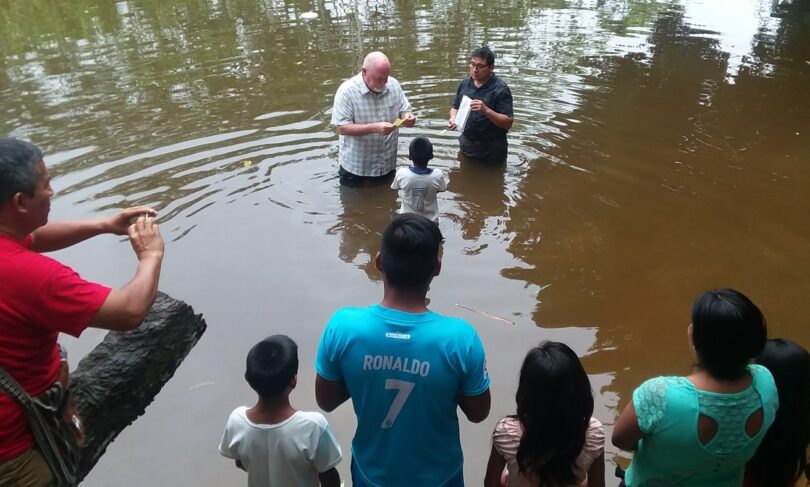“Bishop Sam Gray baptizing a child in the Amazon Region of Peru”
How Confession and Repentance Help to Define Mission
By Bishop Chris Giesler
Preaching Text: Mark 1:4-11
For those of you who are baptized, do you remember who the officiating pastor was? I was baptized on Palm Sunday in 1960 by the Rev. Joe Gray in Managua, Nicaragua. Keep thinking about that question; we’ll get back to it in a minute.
Our Gospel text for this week tells about Jesus’ baptism at the hands of John the Baptist, who is labeled as Jesus’ cousin in Luke’s Gospel. As John is introduced, Mark’s gospel tells us that John “appeared in the wilderness, proclaiming a baptism of repentance for the forgiveness of sins.” We don’t know much about John’s story before this account other than Luke’s reference to John being the son of Elizabeth, the elderly cousin of Mary, who was also pregnant. We are also told in Luke that John leaped in his mother’s womb when Mary visited Elizabeth. After that, we don’t know much until John shows up in the wilderness. Many scholars believe that John became part of an Essene community near the Dead Sea. The Essenes were another priestly order in Judaism during Jesus’ time, much like the Pharisees and Sadducees. But while Pharisees and Sadducees were battling for religious and political power, the Essenes took to the wilderness to escape the world’s distractions and focus on Scripture and prayer. The ruins of their compound near the Dead Sea indicate there was a large pool for water with two sets of steps in it. It was a daily routine for the community members to baptize themselves by wading through this pool at the end of the day. There was a practical component to this in that this ritual would wash off the dirt from the dry and dusty desert, but there was also a spiritual component to this in that it symbolized the washing away of the day’s sins. For them, this was a bath that changed one from dirty to clean on the outside but also marked that on the inside, they were being changed from their sinful nature to a more faithful way of living.
Even today, The Baptism liturgy in our Moravian Book of Worship says, “Therefore live, yet not you alone, but Christ live in your, and the life that which you now live, live by faith in the son of God, who loved you and gave his life for you.” This is a baptism of repentance. A baptism of change!
We often see the words “repentance” and “confession” as synonyms. But they are two sides of the same coin. “Confession” means that we acknowledge and speak aloud the sins that we have committed, and “repentance” means to change our life pattern so that we will not sin in the same way again. Confession looks back at what we have done wrong; repentance looks forward to how we intend to live in a new way.
This was a baptism of repentance for Jesus. While we hold that Jesus lived his life without sin, there is much that changed for Jesus with this baptism. Before this time, he had lived in Nazareth with his family and worked as a carpenter in his father’s line of work. But after this baptism, all of that changed, with him leaving home and setting up a base of operation in Capernaum to travel around Galilee to preach, teach, and heal.
As we stand, still early in this new year, what must we change? How is it that our lives need to change? What sins of this past year can we confess, and how might we repent and live more faithfully in Jesus’ steps?
- How can we involve God in decisions concerning our every relationship?
- How can we involve God in decisions about money, both great and small?
- How can we involve God in decisions about how we spend our time?
- How can we involve God in how we use our leisure time?
When I asked who had baptized you, I was asking a trick question because only God can baptize you. The pastor who officiated at your baptism, however it was done, only stepped in and acted on God’s behalf. It is God who continues to baptize you with that spirit of faithfulness every day as you remember your baptism and seek to grow in your faith. True spiritual growth only happens when we accept the Holy Spirit’s invitation and then respond to it in tangible ways.
It is the process of confession (acknowledgment of sin), repentance (the change of heart), and then living into that change that gives us a mission for the living of our days. How will your change of heart help you to bring God’s love to others in acts of kindness, words of grace, and gestures of our love?







